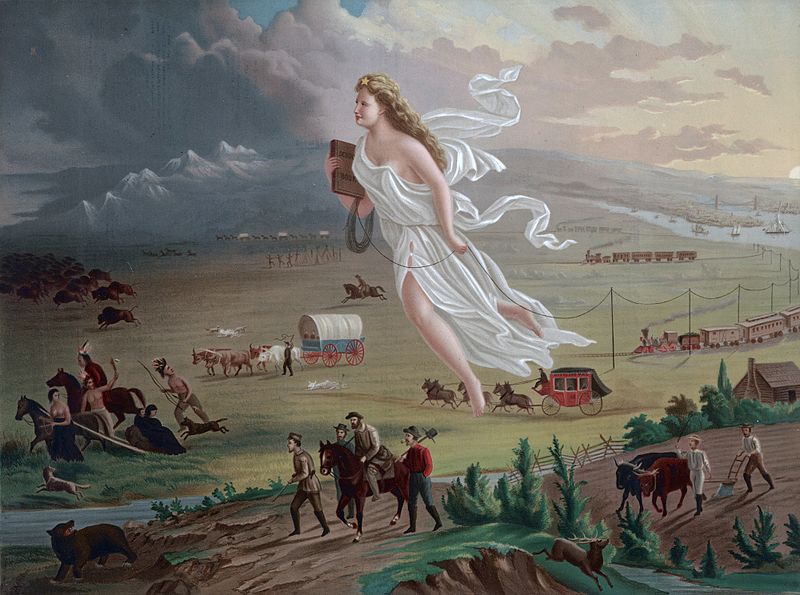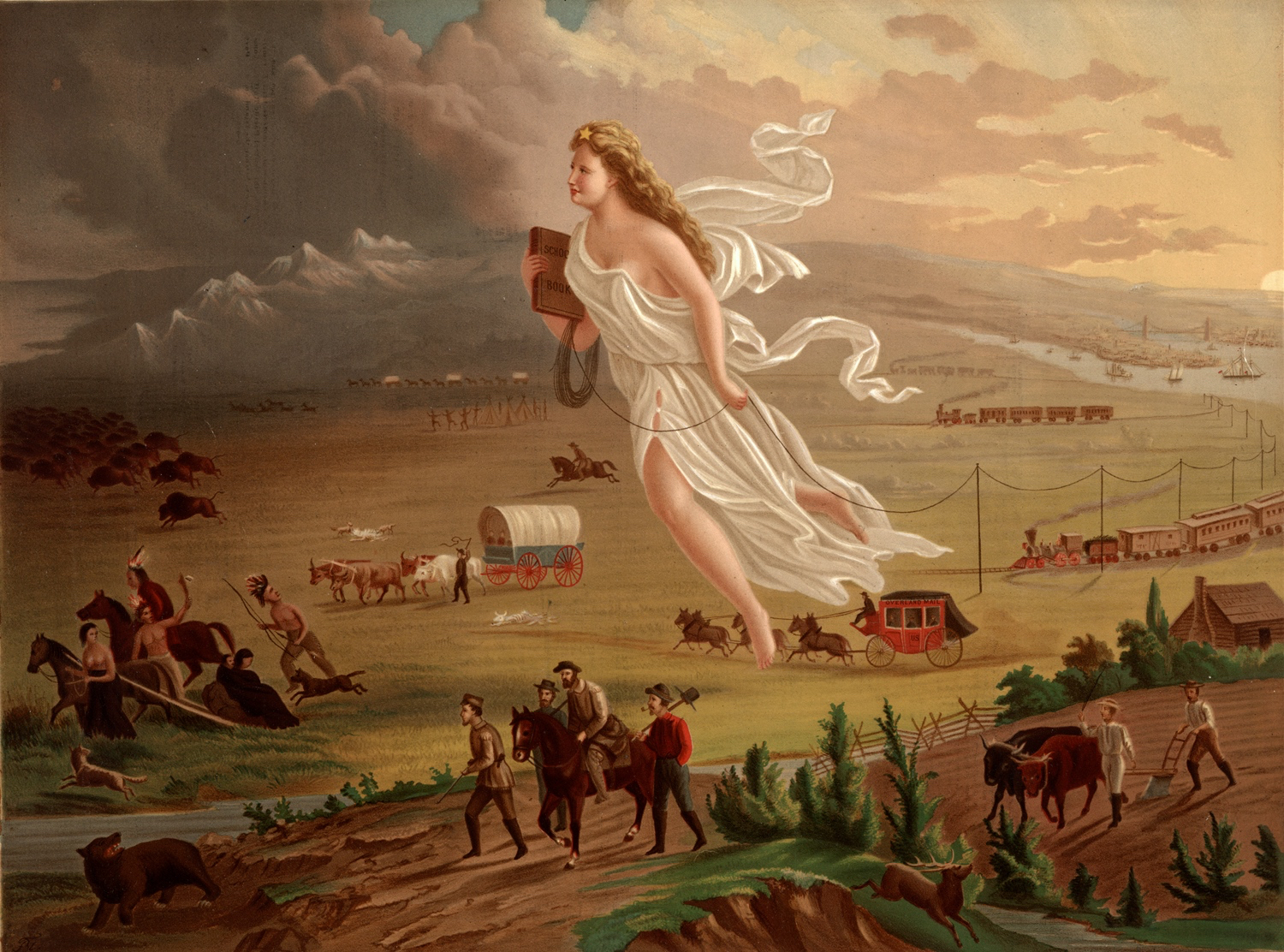Manifest Destiny in the Bible: Divine Plan Unveiled
Manifest Destiny in the Bible refers to the belief that God ordained the expansion of the United States. This ideology was used to justify westward expansion and the displacement of Native American tribes.
Manifest Destiny, a term coined in the 19th century, reflected the conviction that the United States was destined by God to spread across the continent. Proponents of this idea saw it as a divine mission to bring civilization and Christianity to the western territories.
They believed that it was their duty to expand and prosper, shaping the American identity and influencing national policies. However, this concept also led to the displacement and mistreatment of indigenous peoples and contributed to conflicts that shaped the nation’s history. Today, Manifest Destiny remains a controversial and complex topic, reflecting the intersection of religion, ideology, and national identity in American history.

Manifest Destiny: A Historic Overview
Manifest Destiny is a concept deeply rooted in the history of the United States, tracing back to the early origins of expansion and faith. The idea of Manifest Destiny emerged in the 19th century, highlighting a belief in the divine mission to expand westward and spread democracy and freedom. This concept was heavily influenced by the religious fervor of the time, with many Americans viewing westward expansion as a God-given right. The expansionist ideology was fueled by the belief in American exceptionalism and the superiority of democratic values. As a result, it played a significant role in shaping the nation’s policies and attitudes towards territorial expansion. The notion of Manifest Destiny continues to be a topic of historical debate and analysis, as it reflects the complex intersection of religion, politics, and identity in American history.

Biblical Foundations Of Manifest Destiny
The concept of Manifest Destiny finds its roots in both the Old and New Testaments of the Bible. In the Old Testament, there are several insights that contribute to the idea of Manifest Destiny. The Israelites, for example, believed that God had promised them a land flowing with milk and honey, and they saw their conquest of Canaan as a fulfillment of this divine promise. Moreover, the Old Testament contains stories of God’s chosen people being blessed and prospering when they followed His commands.
In the New Testament, the concept of Manifest Destiny is further reinforced. Jesus Christ commissioned his disciples to spread the Gospel to all nations, indicating a divine mandate for expansion and evangelism. The early Christian community believed that they were divinely ordained to bring salvation to the world, which aligns with the idea of Manifest Destiny.
| Old Testament Insights | New Testament Perspectives |
|---|---|
| The Israelites believed in a promised land | Jesus commissioned his disciples for evangelism |
| God’s chosen people prospered when they followed His commands | Early Christians saw themselves as bringing salvation to the world |
Theological Interpretations
The concept of Manifest Destiny in the Bible has been subject to various theological interpretations. One such interpretation is the belief in Providence and Destiny, which suggests that God has a plan for every individual and nation. This interpretation is based on the biblical teachings that God is in control of everything and that everything happens for a reason.
However, there are critiques and counterarguments to this interpretation. Some argue that it promotes fatalism and undermines human agency, while others argue that it leads to a sense of entitlement and justifies imperialism and colonialism. These critiques highlight the need for a nuanced understanding of the concept of Manifest Destiny in the Bible and its implications for individuals and societies.
| Pros | Cons |
|---|---|
| – Belief in God’s plan – Sense of purpose – Hope for the future |
– Promotes fatalism – Undermines human agency – Justifies imperialism and colonialism |
Manifest Destiny In Action
Manifest Destiny in the Bible is a concept that has been debated for centuries. Under the heading of Manifest Destiny in Action, one key aspect to consider is territorial expansion. This expansion had a profound impact on indigenous peoples.
The notion of Manifest Destiny, rooted in the belief that it was God’s will for the United States to expand its territory, led to the westward expansion of settlers. As they moved west, they encountered numerous Native American tribes who already inhabited the land. The consequences for these indigenous peoples were devastating.
Native Americans faced forced displacement, violence, and the loss of their ancestral lands. Treaties were often broken or disregarded, leading to further marginalization and loss of cultural identity. The impact on these communities cannot be understated.
Manifest Destiny in the Bible may have been interpreted as a divine mandate for expansion, but it is essential to recognize the negative consequences it had on Native American populations. This dark chapter in history serves as a reminder of the importance of understanding and acknowledging the complexities of our past.
Symbolism And Prophecy
Symbolism and prophecy in the Bible intertwine to convey the concept of Manifest Destiny. Through allegorical representations and divine revelations, the Bible foreshadows the fulfillment of God’s plan for the chosen people, illustrating the unfolding of destiny through symbolic narratives.
Biblical Symbols In American Expansion
The concept of Manifest Destiny, the belief that it was the divine destiny of the United States to expand its territory, can be traced back to biblical symbolism and prophecy. The Bible has often been used to justify American expansionism by interpreting various passages as supporting the idea of a chosen nation with a mission to spread its influence.
One example of biblical symbolism in American expansion is the comparison of the American pioneers to the Israelites in the Old Testament. Just as the Israelites journeyed to the Promised Land, the pioneers believed they were embarking on a journey to a new and prosperous land ordained by God.
| Symbol | Meaning |
|---|---|
| Wilderness | America as a land of opportunity |
| Promised Land | America as the land of abundance |
| Expansion | Spreading the blessings of civilization |
Furthermore, there are prophetic visions in the Bible that have been interpreted as foreseeing the rise of a powerful nation in the New World. These visions, such as those found in the Book of Isaiah and the Book of Revelation, have been seen as foretelling the emergence of the United States as a dominant world power.
By understanding the biblical symbolism and prophetic visions associated with Manifest Destiny, we can gain insights into the motivations behind American expansion and the role religion played in shaping the nation’s identity and purpose.
Contemporary Reflections
Manifest Destiny, the belief that the United States was destined to expand its territory across the North American continent, has been a controversial and complex topic for centuries. Contemporary reflections on this concept often center around the idea of modern Manifest Destiny. This can be seen in the country’s continued pursuit of global influence and power, as well as in the ongoing debates surrounding immigration and border control.
Despite its controversial legacy, Manifest Destiny has also undergone reinterpretation in recent years. Some have argued that the concept can be reframed in a more positive light, emphasizing the idea of American exceptionalism and the country’s unique role in promoting freedom and democracy around the world.
| Legacy | Reinterpretation |
|---|---|
| Expansionism and territorial conquest | American exceptionalism and global leadership |
| Colonialism and cultural imperialism | Humanitarian intervention and democratic promotion |
| Land grabs and displacement of indigenous peoples | Nation-building and economic development |
Case Studies
Explore compelling case studies that delve into the concept of Manifest Destiny in the Bible, shedding light on its significance and impact. These studies offer valuable insights into the historical and theological dimensions of this intriguing subject.
| The Louisiana Purchase | The acquisition of 828,000 square miles doubled the size of the U.S. |
| The Mexican-American War | Conflict over Texas led to the U.S. gaining territories in the Southwest. |

Concluding Thoughts
Manifest Destiny is a concept that has been associated with American expansionism, but its roots can be found in the Bible. The idea of a divine mission to spread American values across the continent is a controversial one, with many arguing that it was used to justify the displacement of indigenous peoples.
| The concept of Manifest Destiny can be found in the Bible, reflecting a belief in a divine plan for the future. |
| Exploring the idea further, one can see how the biblical narrative shapes the understanding of destiny and purpose. |
Conclusion
The concept of Manifest Destiny in the Bible is a complex and contentious topic. While some interpret biblical passages as supporting this idea, others argue for a more nuanced understanding. Ultimately, exploring this theme can deepen our understanding of history, religion, and the human experience.





